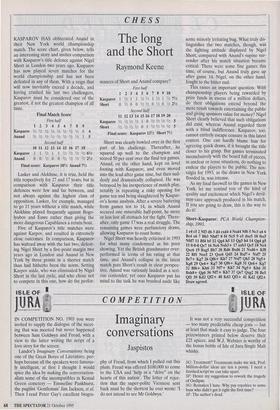CHESS
The long and the Short
Raymond Keene
KASPAROV HAS obliterated Anand in their New York world championship match. The score chart, given below, tells an interesting story and invites comparison with Kasparov's title defence against Nigel Short in London two years ago. Kasparov has now played seven matches for the world championship and has not been defeated in any of them. With a reign that will now inevitably exceed a decade, and having crushed his last two challengers, Kasparov must be considered one of the greatest, if not the greatest champion of all time.
Final Match Score First half
1 2 3 4 5 6 7 8 9 Kasparov 1/2 1/2 1/2 1/2 1/2 1/2 1/2 1/2 0 4 Anand 1/2 1/2 1/2 1/2 1/2 1/2 1/2 1/2 1 5
Second half
10 11 12 13 14 15 16 17 18 Kasparov 1 1 1/2 1 1 1/2 1/2 1/2 1/2 61/2 Anand 0 0 1/2 0 0 1/2 1/2 1/2 1/2 2112 Final score: Kasparov 101/2 Anand 71/2 Lasker and Alekhine, it is true, held the title respectively for 27 and 17 years, but in comparison with Kasparov their title defences were few and far between, and not always against, the highest class of opposition. Lasker, for example, managed to go 11 years without a title match, while Alekhine played frequently against Bogo- lyubov and Euwe rather than giving the more dangerous Capablanca a return bout.
Five of Kasparov's title matches were against Karpov, and resulted in extremely close outcomes. In comparison, Kasparov has waltzed away with the last two, defeat- ing Nigel Short by a five-point margin two years ago in London and Anand in New York by three points in a shorter match than had hitherto been the norm. Setting Karpov aside, who was eliminated by Nigel Short in the last cycle, and who chose not to compete in this one, how do the perfor- mantes of Short and Anand compare?
First half
1 2 3 4 5 6 7 8 9 10 Kasparov 1 1/2 1 1 1/2 1/2 1 1/2 1 1/2 71/2 Short 0 I/2 0 0 I/2 1/2 0 1/2 0 I/2 21/2
Second half
11 12 13 14 15 16 17 18 19 20 Kasparov 1/2 1/2 1/2 1/2 10 1/2 1/2 112 1/2 5 Short 1/2 1/2 1/2 1/2 0 1 1/2 1/2 1/2 1/2 5 Final score: Kasparov 121/2 Short 71/2 Short was clearly bowled over in the first part of his challenge. Thereafter, he squared up well to the champion and scored 50 per cent over the final ten games. Anand, on the other hand, kept on level footing with Kasparov, and even moved into the lead after game nine, but then sud- denly and dramatically collapsed. He was betrayed by his inexperience of match play, notably in repeating a risky opening for game ten and being slaughtered by Kaspar- ov's home analysis. After a severe battering from games ten to 14, in which Anand secured one miserable half-point, he more or less lost all stomach for the fight. There- after, only game 17 was a real struggle. The remaining games were perfunctory draws, allowing Kasparov to coast home.
Nigel Short was heavily criticised in 1993 for what many condemned as his poor showing. Yet the British grandmaster over- performed in terms of his rating at that time, and Anand's collapse in the latest match puts Short's result in clear perspec- tive. Anand was variously lauded as a seri- ous contender, yet once Kasparov put his mind to the task he was brushed aside like some minorly irritating bug. What truly dis- tinguishes the two matches, though, was the fighting attitude displayed by Nigel Short, compared with Anand's supine sur- render after his match situation became critical. There were some fine games this time, of course, but Anand truly gave up after game 14. Nigel, on the other hand, fought to the bitter end.
This raises an important question. With championship players being rewarded by prize funds in excess of a million dollars, do their obligations extend beyond the mere result towards entertaining the public and giving sponsors value for money? Nigel Short clearly believed that such obligations did exist, whereas Anand regarded them with a blind indifference. Kasparov, too, cannot entirely escape censure in this latest contest. One can hardly blame him for agreeing quick draws, if it brought the title closer to his grasp. But games terminated inconclusively with the board full of pieces, in unclear or tense situations, do nothing to endear the players to the public. The nos- talgia for 1993, as the draws in New York flooded in, was intense.
As my final farewell to the games in New York, let me remind you of the kind of quality and excitement which Nigel's devil- may-care approach produced in his match. If you are going to draw, this is the way to do it!
Short–Kasparov: PCA World Champion- ship, 1993.
1 e4 c5 2 Nf3 d6 3 d4 cxd4 4 Nxd4 Nf6 5 Nc3 a6 6 13c4 e6 7 Bb3 Nbd7 8 f4 Nc5 9 e5 dxe5 10 fxe5 Nfd7 11 Bf4 b5 12 Qg4 h5 13 Qg3 h4 14 Qg4 g5 15 0-0-0 Qe7 16 Nc6 Nxb3+ 17 axb3 Qc5 18 Ne4 Qxc6 19 Bxg5 Bbl 20 Rd6 Bxd6 21 Nxd6+ Kf8 22 Rfl NxeS 23 Qxe6 Qd5 24 Rif7+ Nxf7 25 Be7+ Kg7 26 Qf6+ Kh7 27 Nx17 Qh5 28 Ng5+ Kg8 29 Qe6+ Kg7 30 Qf6+ Kg8 31 Qe6+ Kg7 32 Bf6+ Kh6 33 Nf7+ Kh7 34 Ng5+ Kh6 35 Bxh8+ Qg6 36 Nf7+ Kh7 37 Qe7 Qxg2 38 Be5 Qfl 39 Kd2 Qf2+ 40 Kd3 Qt3+ 41 Kd2 Qf2+ Draw agreed.










































































 Previous page
Previous page